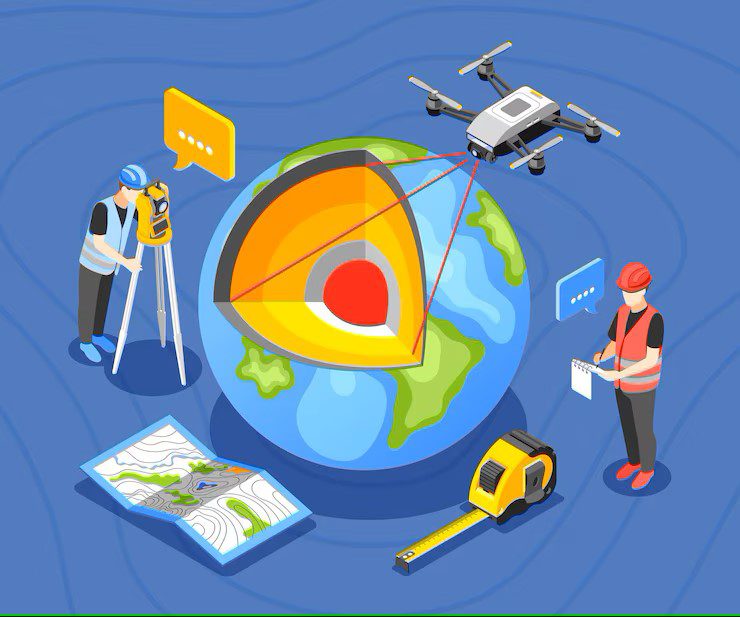11 December 2024
6 minutes read
Masters in Geographic Information Systems (GIS) in the USA

KEY TAKEAWAYS:
- GIS Master’s programs in the USA offer diverse specializations, catering to various career paths in fields like urban planning, environmental management, and data analysis.
- Admission requirements typically include a bachelor’s degree, competitive GPA, recommendation letters, and a statement of purpose, with GRE scores sometimes required.
- Financial planning is crucial, with tuition costs varying among universities and scholarship opportunities available for eligible students.
- Career opportunities for GIS graduates span across government, consulting, research, and tech industries, with roles such as GIS Analyst, Urban Planner, and Environmental Consultant.
- Online GIS programs provide flexibility for professionals, allowing them to pursue advanced education while balancing work and other commitments.
Geographic Information Systems (GIS) have become a cornerstone in the realm of information science, blending geographical data with sophisticated analysis to address numerous challenges across various sectors.
As we step into 2024, the demand for professionals skilled in geographic information science is surging, making a Master of Science in Geographic Information Systems a coveted degree.
This blog aims to guide aspiring GIS professionals through the nuances of pursuing a master’s degree in GIS in the USA, a decision that can significantly shape their career trajectory.
Top GIS Master’s Programs in the USA

| University/College | Program Name | Program Length | Mode (On-Campus/Online) | Key Features |
|---|---|---|---|---|
| Clark University | Master’s in Geographic Information Science | 2 years | On-Campus | Focus on GIS and remote sensing; research projects |
| Saint Louis University | Master of Science in GIS | 2 years | On-Campus & Online | Strong in urban planning and public health GIS |
| University of Southern California | Master of Science in Geographic Information Science and Technology | 1.5 years | On-Campus & Online | Cutting-edge technology and real-world applications |
| Penn State University | Online Master of GIS | 1 year | Online | Flexible for professionals; extensive online resources |
| University of Washington | Master of GIS for Sustainability Management | 1 year | On-Campus & Online | Focus on sustainability and environmental GIS |
Common Coursework and Subjects in GIS Programs
| Course Title | Description | Skills Developed |
|---|---|---|
| Introduction to GIS | Fundamental concepts of GIS, spatial data models, and map design | Basic GIS knowledge, cartography skills |
| Spatial Analysis | Techniques for analyzing spatial data, including statistical and modeling tools | Data analysis, problem-solving |
| Remote Sensing | Principles and applications of remote sensing technology | Image processing, environmental analysis |
| GIS Programming | Introduction to programming languages used in GIS (e.g., Python, R) | Programming skills, automation techniques |
| Cartography and Visualization | Advanced techniques in map-making and data visualization | Design skills, data presentation |
| GIS Project Management | Strategies for managing GIS projects, including budgeting and team coordination | Project management, leadership |
| Geodatabases and Data Management | Database design, data storage, and management in GIS | Database skills, data organization |
| Environmental Applications of GIS | Applying GIS in environmental science and resource management | Environmental analysis, decision-making |
| Urban Planning and GIS | Use of GIS in urban and regional planning scenarios | Urban planning, policy analysis |
| Advanced Remote Sensing | In-depth study of remote sensing applications and technologies | Technical expertise, research skills |
Admission Requirements and Process
Academic Pre-requisites and Qualifications
| University/College | Minimum GPA Requirement | Required Undergraduate Degree/Background | Standardized Tests | Additional Requirements |
|---|---|---|---|---|
| Clark University | 3.0 | Geography, Environmental Science, Computer Science (or related field) | GRE (Optional) | Relevant coursework in GIS or related fields |
| Saint Louis University | 2.75 | Open to all majors, preference for related fields | GRE (Waived for certain conditions) | Work experience in GIS preferred |
| University of Southern California | 3.0 | Related field preferred, open to all majors | GRE (Optional) | Demonstrated interest in GIS, portfolio may be required |
| Penn State University | 3.0 | Geographic Information Science, Earth Science, Computer Science, or Engineering | None | Prior coursework in GIS, statistics, or computer programming |
| University of Washington | 3.0 | Open to all majors, preference for related fields | GRE (Optional) | Portfolio of GIS projects, relevant professional experience |
QUICK TIP!
Start the application process early to avoid last-minute stress and ensure all requirements are met.
Tips for a Successful Application to GIS Master’s Programs
- Start Early: Begin the application process well in advance. This gives you ample time to gather all necessary documents, write your essays, and request recommendations.
- Research Programs Thoroughly: Understand the specific requirements and focus areas of each GIS program you’re applying to. Tailor your application to align with the program’s strengths and objectives.
- Write a Compelling Statement of Purpose: Your statement should clearly articulate your interest in GIS, your career goals, and why you’re a good fit for the program. Highlight any relevant experience or projects.
- Secure Strong Letters of Recommendation: Choose recommenders who know you well and can speak to your abilities and potential in the field of GIS. Provide them with sufficient time to write a thoughtful letter.
- Showcase Relevant Experience: If you have prior experience in GIS or related fields, whether through work, internships, or projects, make sure to highlight this in your application.
- Prepare for the GRE (if required): If the program requires GRE scores, invest time in preparing for the test to achieve competitive scores.
- Proofread Your Application: Ensure that your application is free from grammatical errors and is written. A well-prepared application reflects your attention to detail and seriousness about the program.
- Include a Portfolio (if applicable): For programs that require or recommend a portfolio, include samples of your GIS projects or research that demonstrate your skills and interest in the field.
- Attend Information Sessions and Reach Out: Participate in information sessions or webinars offered by the university. Reach out to admissions officers or program coordinators with any questions.
- Stay Organized: Keep track of deadlines, requirements, and submitted materials for each program. Staying organized helps ensure you don’t miss any critical steps in the application process.
Financial Considerations and Scholarships
Tuition and Living Expenses
| University/College | Estimated Tuition (per year) | Estimated Living Expenses (per year) | Total Estimated Cost (per year) |
|---|---|---|---|
| Clark University | $40,000 | $15,000 | $55,000 |
| Saint Louis University | $35,000 | $14,000 | $49,000 |
| University of Southern California | $45,000 | $17,000 | $62,000 |
| Penn State University | $30,000 (Online) | Not Applicable (Online) | $30,000 (Online) |
| University of Washington | $38,000 | $16,000 | $54,000 |
QUICK TIP!
Seek out scholarships, grants, and financial aid options to alleviate the financial burden of pursuing a master’s degree in GIS.
Scholarship Opportunities and Financial Aid
| University/College | Scholarship/Financial Aid Type | Eligibility Criteria | Award Amount/Type |
|---|---|---|---|
| Clark University | Merit-Based Scholarships | Academic excellence, GIS-related achievements | Varies (partial to full tuition) |
| Saint Louis University | Graduate Assistantships | Enrolled students, academic merit, research/teaching assistant roles | Tuition waiver + Stipend |
| University of Southern California | USC Dornsife Scholarships | Merit and need-based, enrolled students | Varies (partial to full tuition) |
| Penn State University | World Campus Scholarships | Online students, academic merit, financial need | Varies (partial tuition) |
| University of Washington | Various Departmental Scholarships | Academic excellence, research potential | Varies (partial to full tuition) |
Tips for Budgeting and Financial Planning
- Understand Your Expenses: Begin by listing all expected expenses, including tuition, books, housing, food, transportation, and personal expenses. This will give you a clear picture of your financial needs.
- Create a Monthly Budget: Based on your expenses, create a monthly budget. Allocate amounts for essentials like rent and groceries, and include a small portion for discretionary spending.
- Seek Financial Aid and Scholarships: Research and apply for scholarships, grants, and financial aid options offered by your university or external organizations. Every bit of funding helps reduce your overall expenses.
- Consider Part-Time Work: If your program’s workload allows, look for part-time jobs on-campus or nearby. Many universities offer work-study programs that can help cover living expenses.
- Minimize Unnecessary Expenses: Cut back on non-essential spending. This can include eating out less, using public transportation, and choosing affordable housing.
- Take Advantage of Student Discounts: Many businesses offer discounts to students. Always carry your student ID and inquire about student rates for services and products.
- Plan for Emergencies: Set aside a small emergency fund to cover unexpected expenses like medical emergencies or urgent travel.
- Use Student Loan Wisely: If you take out student loans, use them strictly for education-related expenses. Understand the terms of repayment and plan accordingly.
- Monitor Your Spending: Keep track of your spending. Use budgeting apps or spreadsheets to ensure you stay within your budget.
- Plan for Post-Graduation: Start saving for life after graduation, including potential relocation expenses or loan repayments. This forward-thinking approach ensures a smoother transition after completing your program.
Career Paths and Roles for GIS Graduates

| Career Path | Role Description | Industries/Applications |
|---|---|---|
| GIS Analyst/Technician | Analyzes spatial data, creates maps, manages GIS databases | Government, Urban Planning, Environmental Management |
| Urban and Regional Planner | Uses GIS for land use planning and development | Urban Planning, Real Estate, Government |
| Environmental Consultant | Applies GIS in environmental impact assessments, resource management | Environmental Consulting, Non-profit Organizations |
| Geospatial Data Scientist | Integrates GIS with data science for spatial data analysis | Tech Companies, Research Institutes, Analytics Firms |
| Remote Sensing Specialist | Focuses on acquiring and analyzing remote sensing data | Agriculture, Disaster Management, Climate Studies |
| GIS Project Manager | Oversees GIS projects, coordinates teams, and ensures project deliverables | Consulting Firms, Corporate Sector, Government |
| Cartographer and Photogrammetrist | Designs and updates maps works with aerial photographs and satellite imagery | Cartography Firms, Defense, and Surveying Companies |
| GIS Software Developer/Programmer | Develops GIS applications and tools | Software Companies, GIS Technology Firms |
Conclusion
As we have explored, a Master’s degree in GIS is more than just an academic pursuit; it’s a gateway to a dynamic and evolving field with immense potential.
The USA, with its diverse range of top-tier GIS master’s programs, provides an ideal setting for students to acquire the technical skills, practical experience, and industry connections needed to thrive in the world of geographic information science.
Whether you’re interested in environmental management, urban planning, or geospatial data analysis, a master’s in GIS will equip you with the tools to make a significant impact.
Explore a world of learning in the USA with Ambitio! Engage with the brightest minds, define your path, and discover your career. Join us for an adventure beyond books – Study in USA. They Secured Their Dream. Are You Next? Dive into the success stories of students who’ve secured spots in some of the most prestigious institutions in the USA. Get inspired, compare profiles, and discover what it takes to join the ranks of these top admits.
FAQs
What is GIS and why is it important?
GIS integrates hardware, software, and data to manage and analyze geographic information, crucial for decision-making in various fields.
What career opportunities are available after a Master’s in GIS?
Graduates can work in government, consulting, research, and more, with roles like GIS Analyst, Urban Planner, and Environmental Consultant.
What are the typical admission requirements for a GIS Master’s program?
Requirements usually include a bachelor’s degree, a competitive GPA, GRE scores (if required), recommendation letters, and a statement of purpose.
Can I study GIS at the master’s level with a different undergraduate degree?
Yes, but you might need to complete prerequisite courses in related fields like geography or computer science.
Are there online Master’s in GIS programs?
Yes, many universities offer online GIS programs, which are flexible and equally recognized in the industry.

You can study at top universities worldwide!
Get expert tips and tricks to get into top universities with a free expert session.
Book Your Free 30-Minute Session Now! Book a call now




























